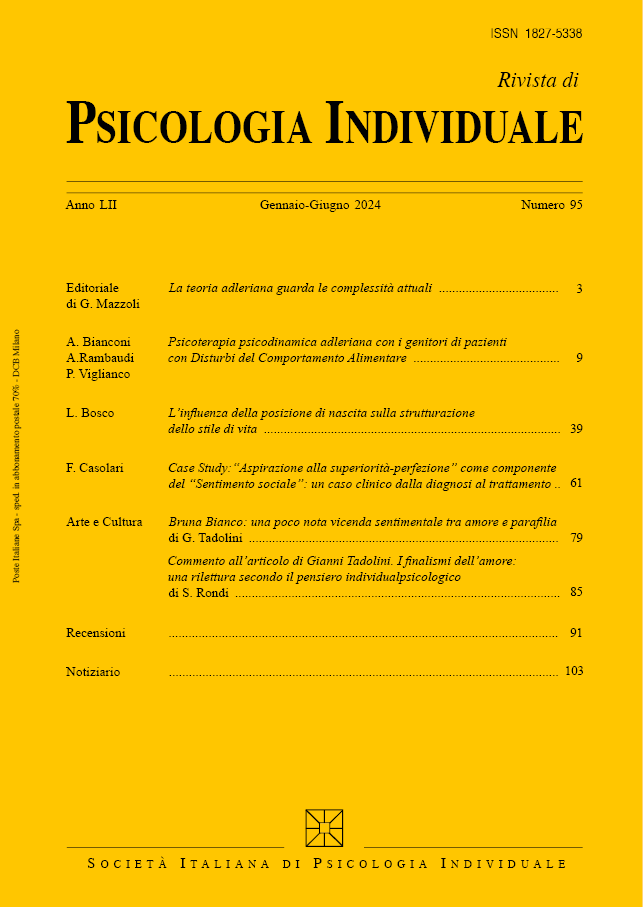Transmotivation: a proposal for a strategy of encouragement
Keywords:
biofilia di fromm, aggressività benigna di rovera, compensazione, contratteggiamento, determinismo morbido di ansbacher, fare come, finalismo, identificazione culturale di rovera, formazione psicoterapeutica, incoraggiamento transmotivazionale di rovera e gatti, psicopedagogia, psicoterapia, processo di incoraggiamento di Dikmeyer and DreykursAbstract
1.A. Encouragement is not simply an educational technique, but requires adequate emotional training on the part of the practitioner, an analysis of their counterattitude, and their ability to communicate with the patient. 1.B. The encouragement process developed by Dinkmeyer and Dreikurs is examined, which aims to motivate the patient (Rovera's ‘intentionality’) to assert themselves in a social context (Rovera's ‘cultural identification’) by relying on cognitive-symbolic elements in a ‘soft determinism’ (Ansbacher) that modulates courage, understood as an ingrained character trait (Maslow), which leads the patient's self-assertion to take a position (lifestyle) towards the demands of society and life (Rovera's benign aggression and Fromm's biophilia). This positive compensation thus becomes a transmotivational process and is an expression of the innate sense of community, whereby encouraging is equivalent to increasing the sense of community. 2. Courage is constituted as a principle of ‘actuality’ (Erkson) of participation with others, together with others, with a willingness to be creative and to recognise values (Agazzi). Lifestyle is subject to transformative processes based on motivations and how they change in intensity and integrate (transmotivation). All this also happens in psychopathology, and psychotherapy can reveal it, unmasking the fictitious purposes of symptoms. 3.A. Both psychopedagogy and psychotherapy are based on creative and artistic work but, in the latter, in addition to demonstrating the method (how to do it), testing in the setting (doing it) is also guaranteed. 3.B.a. The psychopedagogical suggestions of Dikmeyer and Dreikurs are presented, and 3.B.b. the transmotivational encouragement model of Rovera & Gatti is also illustrated. C. Since neuroses ‘take flight’ from the nest of discouraging families, schools, and societies, psychopedagogical action must make use of teachers and counselors who have comprehensive psychotherapeutic training. 4 and 5. The situations in which it is useful to establish an encouragement strategy are listed, along with its rules and three areas of intervention (against symptoms, against anxiety and dysthymia, with analysis and modulation of counterattitudes), specifying that encouragement tends towards motivational maturation (transmotivation) and a teleological reorientation (transfinalization)






